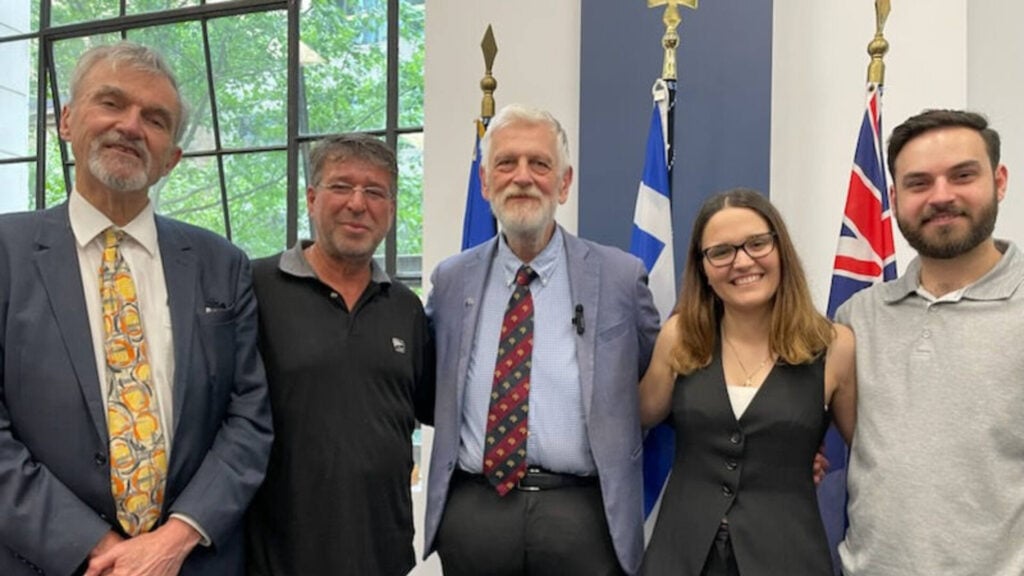Greece’s Deputy Minister of Foreign Affairs Ioannis Loverdos professed a strong message encouraging all Greek Australians to go through the channels to gain the right to vote, stating that is a vehicle for them to “become an even bigger part of Greece”.
Loverdos and a delegation of officials from Greece spoke with Greek Australian media at a press conference with media at the Consulate General premises on Thursday afternoon (9 October), addressing numerous topics relevant to our community.
The subjects discussed were various, including matters related to the operations of Greek Consulates, support for Greek at all levels of education, and simplifying processes for gaining citizenship and applying to vote in future elections.
Answering a question from Neos Kosmos on the reasons Greek Australians should go through the effort to vote, Loverdos noted the were twofold.
“The first reason is this: if you vote in the elections, you become an even bigger part of Greece,” the Deputy Minister of Foreign Affairs said, adding “you play a direct role in Greek affairs”.
“Reason number two is this: you become more relevant to the Greek state, and the Greek state then needs you more.”
Loverdos noted that the ability to vote overseas was something Greeks abroad demanded and they are committed to engaging with them to increase the number of votes that come from other countries, including Australia.
“Participation is very important. You need this, and the Greek government also needs you,” he said.
“It doesn’t matter which party you vote for, as long as you do vote.”
Athanasios Balermpas, Secretary General for Home Affairs & Organisation, Ministry of Interior, confirmed that an election booth can be created at any location so long as there are 40 registered voters listed as from that place.
For example, if 40 registered voters listed Parramatta as their area, then that would be sufficient to establish an election booth there.
Balermpas stated that efforts are being made at the Ministry of Interior to create a website specifically on how to vote at elections that will be in six-seven languages, an effort in line with their broader effort to simplify many processes through digital technology.
He cited the Greek State portal, gov.gr, as a tool they will continue to develop that will work to simplify the many processes pertaining to elections, Greek citizenship etc.
“Consulates are understaffed”
Loverdos admitted that a major issue of relevance to the Greek diaspora around the world is the delay in appointments at Consulates.
“The Consulate is understaffed,” he said.
“It is an issue we face at all the consulates around the world, and we are trying to address it by discussing it with the local staff.”
He noted that they are incentivising staff from the Ministry of Foreign Affairs to come to work in Australia.
“We are giving them pay rises to encourage them to come here,” Loverdos said.
“We don’t have an infinite number of employees. We will need to hire new ones.”
The Deputy Minister of Foreign Affairs confirmed they are working towards implementing a digital platform that would be able to assist and provide some consular services through the internet.
“There is a pilot program that is still being tested.”
Problems facing Modern Greek education
Loverdos emphasised his understanding with the problems facing the study of Greek at all levels (especially tertiary level).
He remarked that their donation of 10,000 euros to the Department of Modern Greek and Byzantine Studies at the University of Sydney was an “important but mostly symbolic gesture”, and that it is difficult for the Greek state to offer substantial support.
“Greece is not a rich country which can afford to maintain such initiatives,” he said in response to Neos Kosmos‘s question on the subject, while noting they have doubled the number of university departments they have sponsored in the past year.
“We need sponsorships from other sources, such as the local Greek communities.”
He appealed to the philanthropic and patriotic spirit of affluent Greek Australians to support causes related to the language and culture.
“I urge affluent Greeks all over the world to support these efforts.”
Loverdos added in relation to the notion of helping send teachers from Greece to Australia that cost-of-living again plays a large role as a deterrent, while the distance between the two countries is also a concern.
“We are trying to bring more of them here. A great effort is being made on that. I had a meeting with the Education Minister on that subject,” he said.
“It isn’t easy, but we are working on it.”
The Deputy Minister stressed his view that, above all, learning Greek must start in the home.
“If you don’t speak Greek at home with your mother and/or father, it will be very difficult to pick it up,” he said.
“The most important thing is for the language to be spoken in the home. That is the only way you can really learn it.”
Also at the press conference was Dimitrios Karnavos (Secretary General for Citizenship, Ministry of the Interior), and Katerina Ouli (General Manager for Citizenship).
The whole delegation stressed the significance of Greek Australians making the effort to go through the procedure of gaining citizenship, with the Greek state working hard to simplify the processes and make further information readily accessible via digital platforms.







